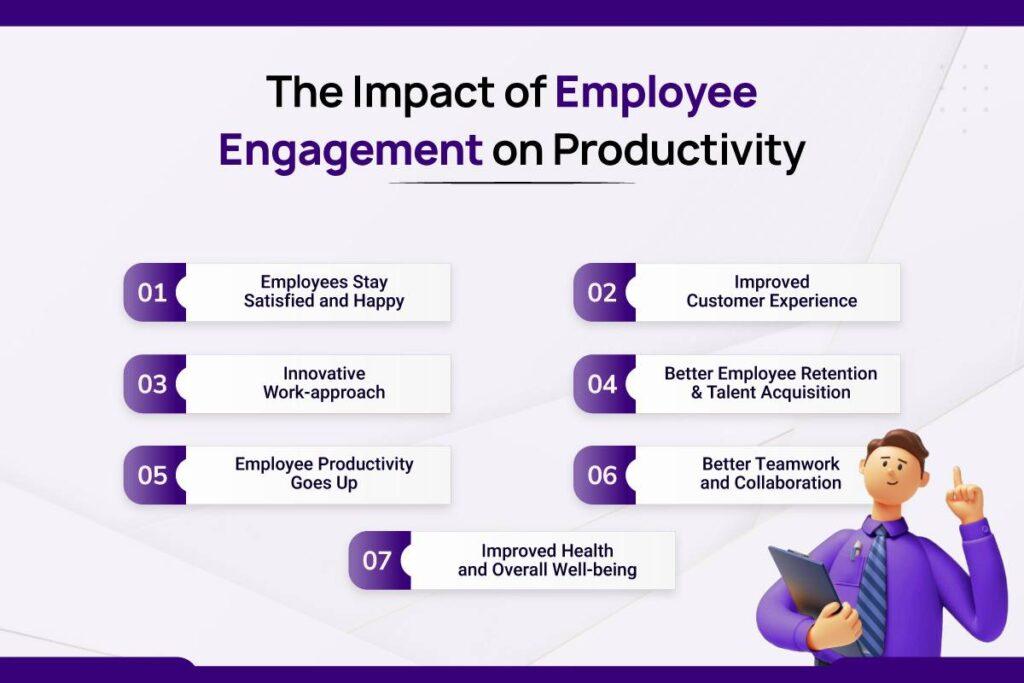Employee engagement is a critical factor in uplifting productivity within an organization. Employees engaged in work are dedicated to their work and give every ounce of their energy in delivering quality output.
They are often determined to meet the organization’s goals and targets. Hence, such a workforce is critical for an entire organization to beat competitors and achieve massive success.
Today, we’ll broadly discuss the impact of employee engagement on productivity.
What is Employee Engagement?

Employee engagement means how much a worker is desired or enthusiastic to perform office duties. They are often satisfied and committed to helping the entire organization bloom.
Engaged employees are highly productive and perform at a level above others. They also keep an eye on their work performance and the surroundings in which they work to make a difference. As a whole, they contribute to the organization’s growth and success.
Why is Employee Engagement So Important in the Workplace?
Employee engagement is crucial in the workplace because it contributes more to the organization’s growth and success. Highly engaged employees have higher productivity levels and tend to be beneficial for individuals and, from the organizational point of view.
When there is improved employee engagement, employees feel a sense of belonging and invested in their work, they are pumped up to give their all for the organization’s benefit. Thus, it increases productivity.
Moreover, they are happier and have higher job satisfaction. They are more likely to work in the same organization for a longer duration. Hence, it directly impacts employee retention.
Not only that, employees who are engaged have a deep and strong bond with the organization. They are fully aware of their role, priorities, and mission, resulting in producing higher quality work.
To sum up, employee engagement is closely linked to organizational success. Employees who are engaged in the workplace help the organization thrive more and ultimately meet bigger goals in no time.
The Impact of Employee Engagement on Productivity

When a worker has improved employee engagement, they give their 200%. It automatically leads to an increase in motivation and productivity. Here are some of the impact of employee engagement on productivity:
Employees Stay Satisfied and Happy
Organizations with a positive work environment make employees feel valued or supported. It uplifts the employee engagement ratio, making them dedicated and happy with their role. Hence, it contributes to greater job satisfaction, turning them into loyal employees for years.
Improved Customer Experience
Employees who are engaged in their work provide excellent customer service. They’re satisfied and happy by themselves, which is also reflected in the talks with their customers.
They’re more likely to communicate cheerfully with customers by using platforms such as KrispCall, Zoom, and Google Meet which makes their communication streamline and solves their issues promptly. It results in enhanced customer satisfaction and loyalty.
Innovative Work-approach
They often go above the regular work pattern and are innovative. When employees get a healthy work environment, they think creatively and bring innovative ideas that add value to the organization’s welfare.
- Better Employee Retention & Talent Acquisition
Employee engagement plays a vital role in building a positive work culture and supportive environment. In such an environment, employees’ opinions and ideas are heard by other team members and implemented.
This way, employees can bring in and showcase their full potential that they’ve got without any hesitation. It also positively impacts productivity levels and organizational performance and helps achieve a better position in the market.
With this approach, employees look forward to staying with the organization in the long run. Thus, it enhances employee retention too.
Employee Productivity Goes Up
Without a doubt, organizations with high levels of engagement have a motivated and productive workforce. They know precisely what role to fulfill, are fully connected to the work, and are backed by a supportive environment.
Hence, they are motivated to do well in their particular roles. And more driven to meet the individual and organizational goals.
Better Teamwork and Collaboration
Employees who are highly engaged have better teamwork and coordination with their teammates. A positive work environment includes healthy competition, effective collaboration with teammates, sharing ideas, and helping each other.
One way to boost teamwork is by providing employees with the right tools and technologies. For example, if some of your team members are in the UK, then you can get a UK virtual phone number to give them a way to stay connected even from outside the nation.
Improved Health and Overall Well-being
Highly determined employees love doing their work and don’t feel pressured or experience a higher stress level. It leads to better health and improved well-being.
Working in a healthy environment reduces unnecessary workload, and work becomes fun-like. This way, employees give their best output and remain productive in the long run.
Conclusion
Employee engagement positively impacts an organization’s productivity. An employee who is highly engaged is seriously committed to their work, has higher job satisfaction, and always willing to give the best shot so the organization thrives.
Also, engaged employees are highly driven, bring their ‘A’ game into their work, and communicate fluently. Most importantly, they consistently align with the company’s goals, mission, and values.
Organizations can benefit from employee engagement as they work diligently to ensure more significant growth and success.
FAQS
Employee productivity has a more significant impact on the organization’s success. Motivated employees work with sincerity and dedication so that the organization can achieve greater heights.
The main objective of employee engagement is to create a positive environment. In such an environment, employees feel motivated, committed, and ready to give it all to the organization.
Various factors can impact productivity, such as effective communication, work-life balance, employee engagement, efficient leadership, workplace culture, etc.
Organizations must address several things and include strategies to enhance low engagement. These are:
Strong Leadership
Flexible Work Arrangements
Efficient Communication
Training and Development Programs
Timely Appraisals and Benefits
Work-Life Balance
Team Building Programs

Leave a Reply